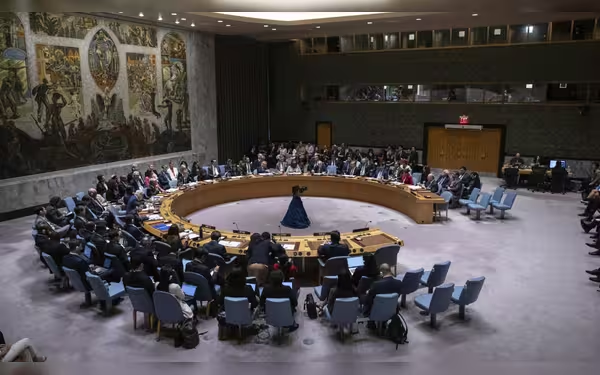Saturday, November 16, 2024 07:36 PM
UN Security Council Supports Lebanon Peacekeepers Amid Israeli Attacks
- UN Security Council condemns attacks on peacekeeping positions.
- Israeli military operations raise concerns for UNIFIL safety.
- Calls for stronger mandate to deter Hezbollah's influence.
 Image Credits: arabnewspk
Image Credits: arabnewspkUN Security Council expresses concern over attacks on peacekeepers in Lebanon, emphasizing the need for safety and stability in the region.
The ongoing conflict between Israel and Hezbollah has once again drawn the attention of the international community, particularly the United Nations Security Council. Recently, several United Nations peacekeeping positions in southern Lebanon were targeted during clashes between the Israeli military and Iran-backed Hezbollah militants. This situation has raised significant concerns regarding the safety of UN peacekeepers and the stability of the region.
On Monday, the UN Security Council, comprising 15 member states, issued a statement expressing its strong concern over the attacks on UN peacekeeping positions, known as UNIFIL. The council emphasized that "UN peacekeepers and UN premises must never be the target of an attack," highlighting the critical role that UNIFIL plays in maintaining peace along the border between Lebanon and Israel.
The Security Council also reiterated the importance of fully implementing resolution 1701, which was established in 2006 to ensure peace in the region. While the council acknowledged the need for further practical measures to achieve this goal, it did not provide specific details on how to proceed. Since the beginning of the Israeli ground operation in Lebanon on October 1, UNIFIL has faced 20 incidents, including direct fire and a recent breach by Israeli tanks into a UNIFIL base.
In these incidents, five peacekeepers were injured, with one sustaining a bullet wound. The source of the gunfire remains unconfirmed, adding to the uncertainty surrounding the situation. Israel has been urging UN peacekeepers to withdraw 5 kilometers from the so-called Blue Line, which separates Lebanon from Israel, citing safety concerns.
Israeli Prime Minister Benjamin Netanyahu has called for the withdrawal of UNIFIL, stating that "the time has come for you to withdraw UNIFIL." However, UN peacekeeping chief Jean-Pierre Lacroix has made it clear that UN troops will not move, emphasizing that the UN is continuously reviewing the situation and has contingency plans in place.
Deputy US Ambassador Robert Wood stressed the importance of allowing UNIFIL to perform its duties effectively. The Security Council authorized UNIFIL under resolution 1701 to assist Lebanese forces in ensuring that southern Lebanon is free of armed personnel and weapons, except for those belonging to the Lebanese government. Lacroix pointed out that UNIFIL's role is supportive, and it should not be held responsible for the lack of implementation of resolution 1701.
Israel has argued that the Lebanese army and UNIFIL have failed to control the area, with Israeli officials stating that their military is now enforcing resolution 1701 by dismantling Hezbollah's infrastructure. Both the United States and France have emphasized the need to strengthen Lebanon's army to ensure the effective implementation of resolution 1701.
Russian UN Ambassador Vassily Nebenzia expressed concerns about the jeopardization of UNIFIL, stating that it is unacceptable for one country to openly threaten its personnel. UNIFIL is also authorized to assist the Lebanese government in preventing the illicit transport of weapons into the country, as well as to monitor violations of the Blue Line.
As discussions continue regarding the future of UNIFIL, Israeli officials have called for a more robust mandate to deter Hezbollah. However, any changes to UNIFIL's mandate would require approval from the Security Council, and currently, there are no discussions on this matter. The mission is authorized until August 31, 2025.
The situation in southern Lebanon remains tense, and the role of UN peacekeepers is more crucial than ever. As the international community watches closely, it is essential to find a path toward lasting peace and stability in the region. The safety of UN personnel and the effectiveness of peacekeeping operations will be vital in addressing the ongoing challenges posed by the conflict.













